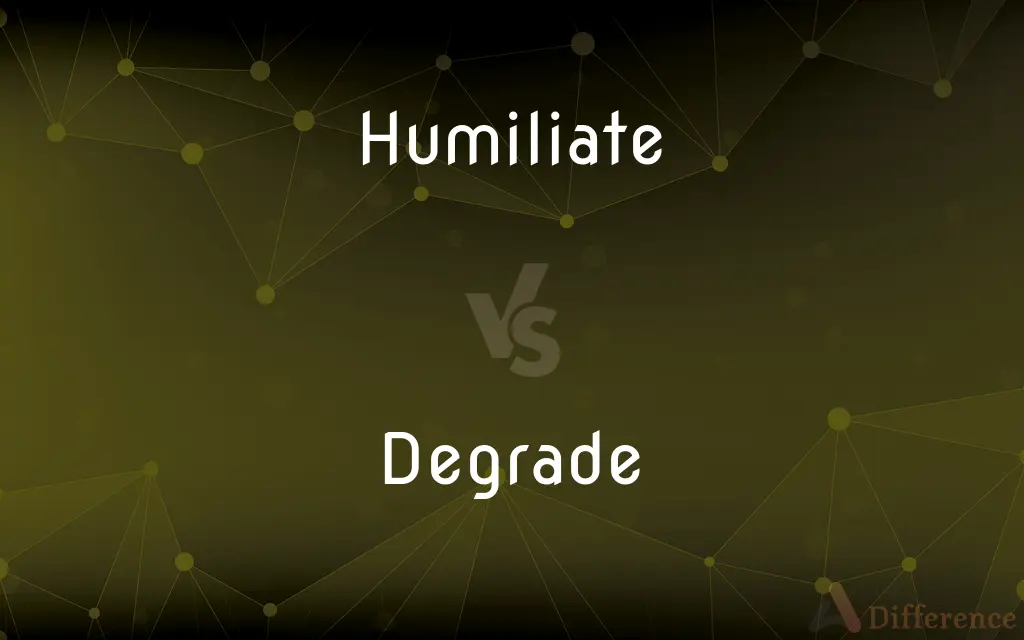Humiliate vs. Degrade — What's the Difference?
Edited by Tayyaba Rehman — By Urooj Arif — Updated on April 9, 2024
Humiliation involves causing someone to feel ashamed or foolish, often in public, while degradation involves lowering someone in dignity, status, or quality, potentially in private or public settings.

Difference Between Humiliate and Degrade
Table of Contents
ADVERTISEMENT
Key Differences
Humiliation is a psychological act that makes someone feel deeply ashamed, embarrassed, or mortified, usually in the eyes of others. It often involves a public component, where the victim's diminished self-worth becomes a spectacle. Degrade, on the other hand, refers to the act of reducing someone's rank, status, or dignity, which can happen both publicly and privately, through actions or words that make them feel inferior or less valuable.
While humiliation is closely linked to the social and emotional impact on an individual, highlighting the public exposure of one's shortcomings or failures, degradation is more about the process or result of lowering in status or character, not necessarily linked to public exposure. Degradation can also refer to the physical deterioration of objects, not just the lowering of human dignity.
Humiliation often relies on the subjective feelings of shame and embarrassment experienced by the person being humiliated, requiring an audience to witness or perceive the act. Degradation, whereas, can be objective, such as a demotion at work or a reduction in social standing, and does not always need an audience to have its effect.
The intent behind humiliation is usually to cause emotional pain or embarrassment, often for the purpose of exerting power or control. In contrast, degradation can be a consequence of one's actions or behaviors, intended or unintended, leading to a decrease in respect, honor, or esteem.
Despite their differences, both humiliation and degradation have profound effects on an individual's psychological well-being. They can lead to feelings of worthlessness, loss of respect, and can significantly impact an individual's social standing and self-esteem.
ADVERTISEMENT
Comparison Chart
Definition
Making someone feel ashamed or foolish.
Lowering someone in dignity, status, or quality.
Public vs. Private
Often public, requiring an audience.
Can be public or private.
Emotional vs. Objective
Relies on subjective feelings of shame.
Can be an objective lowering of status.
Intent
To cause emotional pain or embarrassment.
To reduce respect, honor, or esteem.
Effects
Leads to feelings of shame and embarrassment.
Leads to loss of dignity or respect.
Compare with Definitions
Humiliate
Situations where one's flaws or mistakes are exposed to others.
Falling on stage was the most humiliating moment of her life.
Degrade
Reducing the complexity or quality of a substance or entity.
Overcooking vegetables can degrade their nutritional value.
Humiliate
Psychological impact that lowers someone's self-esteem or self-worth.
Constant ridicule from peers can humiliate and damage a child's confidence.
Degrade
Physical or moral deterioration that diminishes quality, status, or condition.
Pollution can degrade the quality of the environment.
Humiliate
Emphasizing the loss of social status or public embarrassment.
The public scandal humiliated the politician beyond recovery.
Degrade
The process of being demoted or losing one’s status.
His actions led to being degraded from his position of authority.
Humiliate
Actions or words designed to cause embarrassment or shame.
The manager's harsh criticism in front of the team served to humiliate rather than help.
Degrade
To lower in dignity, honor, or esteem; can occur privately or publicly.
The unfair treatment degraded him in the eyes of his colleagues.
Humiliate
To make someone feel ashamed and foolish by injuring their dignity and self-respect, especially publicly.
Being laughed at in class humiliated him deeply.
Degrade
Actions that result in someone feeling worthless or respected less.
Bullying degrades its victims and erodes their sense of worth.
Humiliate
To cause (someone) to feel a loss of pride, dignity, or self-respect
Humiliated him with a contemptuous refusal.
Degrade
To lower in quality or value; make inferior or less valuable
Land that was degraded by overgrazing.
A virus that degrades the computer's performance.
Humiliate
(transitive) To cause to be ashamed; to injure the dignity and self-respect of.
Degrade
To lower in dignity; dishonor or disgrace
Seemed to feel that he was degrading himself in accepting the invitation.
Humiliate
(transitive) To make humble; to lower in condition or status.
Degrade
To reduce in grade, rank, or status; demote.
Humiliate
To reduce to a lower position in one's own eyes, or in the eyes of others; to cause a loss of pride or dignity; to humble; to mortify.
We stand humiliated rather than encouraged.
Degrade
(Geology) To lower or wear away by erosion or weathering.
Humiliate
Cause to feel shame; hurt the pride of;
He humiliated his colleague by criticising him in front of the boss
Degrade
To cause (an organic compound) to undergo degradation.
Degrade
To fall to a lower rank or status.
Degrade
To undergo degradation; decompose
A chemical that degrades rapidly.
Degrade
(transitive) To lower in value or social position.
Fred degrades himself by his behaviour.
Degrade
To reduce in quality or purity.
The DNA sample has degraded.
Degrade
To reduce in altitude or magnitude, as hills and mountains; to wear down.
Degrade
To reduce from a higher to a lower rank or degree; to lower in rank; to deprive of office or dignity; to strip of honors; as, to degrade a nobleman, or a general officer.
Prynne was sentenced by the Star Chamber Court to be degraded from the bar.
Degrade
To reduce in estimation, character, or reputation; to lessen the value of; to lower the physical, moral, or intellectual character of; to debase; to bring shame or contempt upon; to disgrace; as, vice degrades a man.
O miserable mankind, to what fallDegraded, to what wretched state reserved!
Yet time ennobles or degrades each line.
Her pride . . . struggled hard against this degrading passion.
Degrade
To reduce in altitude or magnitude, as hills and mountains; to wear down.
Degrade
To degenerate; to pass from a higher to a lower type of structure; as, a family of plants or animals degrades through this or that genus or group of genera.
Degrade
Reduce the level of land, as by erosion
Degrade
Reduce in worth or character, usually verbally;
She tends to put down younger women colleagues
His critics took him down after the lecture
Degrade
Lower the grade of something; reduce its worth
Common Curiosities
Is degradation always intentional?
Degradation can be both intentional and unintentional, depending on the context and actions involved.
Can objects be humiliated or only degraded?
Objects can only be degraded in terms of their condition or value, as humiliation involves emotional and social aspects applicable only to sentient beings.
What are the long-term effects of humiliation and degradation?
Long-term effects can include lowered self-esteem, social anxiety, depression, and other serious psychological impacts.
How do cultures differ in their perception of humiliation and degradation?
Cultural values and norms significantly influence the perception and tolerance of humiliation and degradation, with some cultures placing a higher emphasis on honor and dignity.
Is there a difference in how humiliation and degradation are experienced based on gender?
Experiences can vary by gender, influenced by societal norms and expectations, which can shape the context and impact of humiliation and degradation.
How does society view humiliation and degradation?
Both are generally viewed negatively, as they harm individuals' dignity and self-worth, and can contribute to a toxic social or work environment.
Can public figures recover from humiliation or degradation?
Recovery depends on several factors, including the nature of the incident, public response, and the individual's actions towards restitution or apology.
What role does empathy play in preventing humiliation and degradation?
Empathy can play a crucial role in understanding the impact of one's actions on others, helping to prevent behaviors that humiliate or degrade.
How do humiliation and degradation play a role in workplace dynamics?
They can contribute to a hostile work environment, impacting morale, productivity, and employee retention.
Can humiliation be experienced without an audience?
While typically associated with public exposure, an individual can feel humiliated by their own actions in private, through self-reflection.
Can legal systems address acts of humiliation and degradation?
Yes, legal systems can address such acts, especially when they constitute harassment, bullying, or discrimination, providing remedies or sanctions against the perpetrators.
Can a society or community be humiliated or degraded?
Yes, communities or societies can feel humiliated or degraded, especially in contexts of cultural, national, or international conflicts.
How do humiliation and degradation affect children differently than adults?
Children may be more vulnerable to the effects, as their self-esteem and identities are still developing, potentially leading to longer-lasting impacts.
Can technology amplify the effects of humiliation and degradation?
Yes, with the prevalence of social media, instances of humiliation and degradation can be amplified, reaching a wider audience and intensifying the impact.
How can individuals recover from humiliation or degradation?
Recovery can involve seeking support, rebuilding self-esteem, and sometimes confronting or reconciling with the source of the harm.
Share Your Discovery

Previous Comparison
Lord vs. Ruler
Next Comparison
Tidy vs. CleanAuthor Spotlight
Written by
Urooj ArifUrooj is a skilled content writer at Ask Difference, known for her exceptional ability to simplify complex topics into engaging and informative content. With a passion for research and a flair for clear, concise writing, she consistently delivers articles that resonate with our diverse audience.
Edited by
Tayyaba RehmanTayyaba Rehman is a distinguished writer, currently serving as a primary contributor to askdifference.com. As a researcher in semantics and etymology, Tayyaba's passion for the complexity of languages and their distinctions has found a perfect home on the platform. Tayyaba delves into the intricacies of language, distinguishing between commonly confused words and phrases, thereby providing clarity for readers worldwide.














































